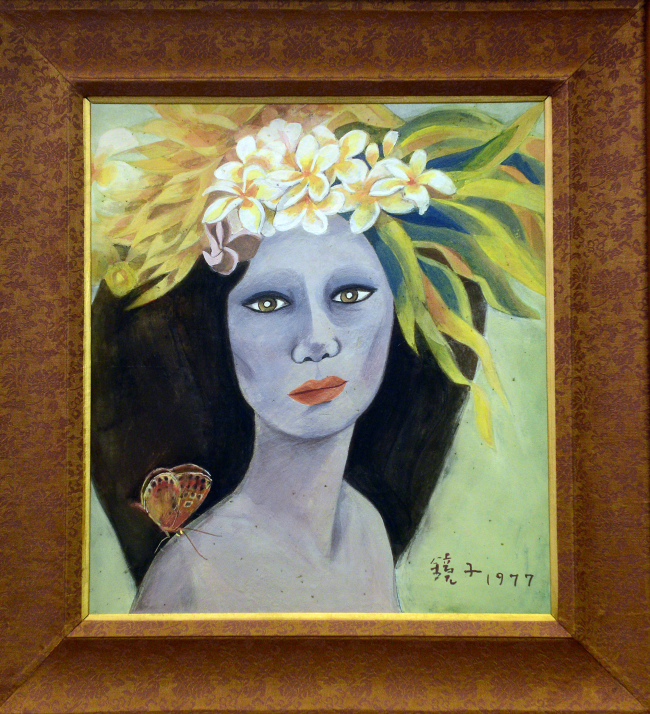Prosecutors announced Monday that “Beautiful Woman” was painted by the late Korean artist Chun Kyung-ja, ending a 25-year controversy over the authenticity of the work which the artist had denied creating.
The Seoul Central District Prosecutors’ Office conducted a nearly five-month investigation into the authenticity of the painting after Chun’s family sued several officials at the National Museum of Modern and Contemporary Art, Korea, which stores the piece, alleging infringement of copyright laws and defamation.
The prosecution said it compared the painting with 13 of Chun’s works and a fake piece by forgery artist Kwon Choon-sik, consulting with the National Forensic Service and the Korea Advanced Institute of Science and Technology.
Various technical tools were employed, including X-ray, infrared rays, transmitted light, 3-D filming, digital image analyses, and DNA and handwriting analyses of artists Chun and Kwon, who claimed to be the painter of “Beautiful Woman” before withdrawing the statement and then once again claiming it as his own work.
The prosecution concluded that the painting was created using the same techniques that are found in Chun’s other works.
Chun’s method was to graft together layers of rice paper, lay out a background drawing using glue, chalk and aluminum sulfate, overlay paint numerous times on top, then complete the coloring process with stone paint.
The prosecution also said it discovered contours on “Beautiful Woman” similar to those found in Chun’s other works, undetectable to the naked eye and not replicated on the forged work.
The findings contradict French image analysis firm Lumiere Technology’s conclusion in September that there is only a 0.0002 percent chance that the piece could have been painted by Chun.
“We had always believed that the painting was genuine,” Lee Ki-seok, a communications officer at MMCA, told The Korea Herald. “We will make sure the analyses, collection and management of our pieces are carried out transparently in the future.”
 |
“Beautiful Woman” is displayed at the Seoul Central District Prosecutors’ Office. It was declared by the prosecution Monday as a genuine piece by the late artist Chun Kyung-ja. (Yonhap) |
Fake or real, the 25-year debateThe authenticity of “Beautiful Woman” had been questioned ever since it was exhibited at the MMCA in 1991. Chun denied drawing it and called it a fake. The Galleries Association of Korea and Korean art circles conducted their own analyses and declared that it was, in fact, Chun’s piece.
In 1999, artist Kwon Choon-sik, who was under investigation for another art forgery, came forward and said he had forged “Beautiful Woman,” while MMCA continued to insist it was a genuine Chun.
Chun’s daughter Sumita Kim, a professor of art at Montgomery College in the US, sued MMCA’s Director Bartomeu Mari and five others for defamation of the deceased and infringing copyright in May, after years of dispute with MMCA.
The Chun family’s lawyer Bae Keum-ja had claimed that the museum “wrongfully profited” from the forged piece.
The museum had called Chun “nuts” and said she was “suffering from dementia” when the artist, then in her 60s, said the painting was not her creation, Bae told The Korea Herald last year.
In October, Lumiere Technology, a French firm specializing in image analysis, judged that the work was a forgery and submitted its report to Chun’s family and the Korean prosecution.
Chun is heralded as a female icon in Korea’s male-dominated art world. She is known for her use of bold colors in female portraits, and paintings of flowers, animals and exotic landscapes, which she called “reflections of her inner self.” Renowned paintings include “A Mode of Life” (1951) and “Page 22 in My Sorrowful Legend” (1977).
Chun died on Aug. 6, 2015 in New York, where she had lived since 1998, at the age of 91.
By Rumy Doo (
doo@heraldcorp.com)








![[Today’s K-pop] Blackpink’s Jennie, Lisa invited to Coachella as solo acts](http://res.heraldm.com/phpwas/restmb_idxmake.php?idx=644&simg=/content/image/2024/11/21/20241121050099_0.jpg)